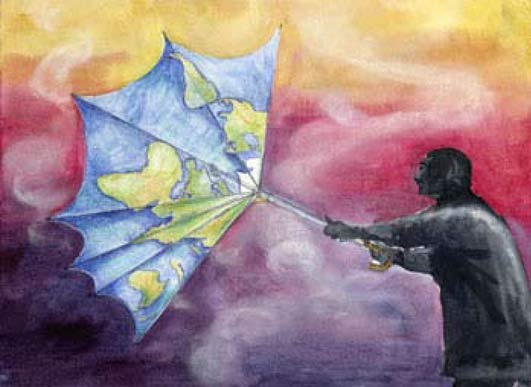In the wake of political news, some climate change notes as we weather tornadoes, atmospheric rivers and other natural calamitous-phenomenon increasing in chaotic intensity as the world warms hotter and hotter.
Another must-read climate feature from The New York Times yesterday — a view of the Southern Ocean where Antarctica is going crazy:
“From no perspective is there any place more important than the Southern Ocean,” said Joellen L. Russell, an oceanographer at the University of Arizona. “There’s nothing like it on Planet Earth.”
For centuries this ocean was largely unknown, its conditions so extreme that only a relative handful of sailors plied its iceberg-infested waters. What fragmentary scientific knowledge was available came from measurements taken by explorers, naval ships, the occasional research expeditions or whaling vessels.
But more recently, a new generation of floating, autonomous probes that can collect temperature, density and other data for years — diving deep underwater, and even exploring beneath the Antarctic sea ice, before rising to the surface to phone home — has enabled scientists to learn much more.
They have discovered that global warming is affecting the Antarctic current in complex ways, and these shifts could complicate the ability to fight climate change in the future.
Meanwhile, in the opposite pole zone — the Arctic is heating faster than anywhere on earth. Via ABC News, also yesterday:
Scientists have long predicted that sea level rise will be one of the most disastrous consequences of global warming — and now, they’re discovering that the northernmost region, the biggest contributor to sea level rise, is warming at unprecedented rates.
Climate change is transforming the Arctic into a “dramatically different state,” with the region warming at a rate more than twice as fast as the rest of the world due to the melting of white and sea ice, according to the 2021 Arctic Report Card released by the National Oceanic and Atmospheric Administration Tuesday morning.
The substantial decline in Arctic sea ice extent since 1979 is one of the most iconic indicators of climate change, according to the report.
Summer 2021 saw the second-lowest amount of older, multi-year ice since 1985, and the post-winter sea ice volume in April 2021 was the lowest since records began in 2010.In addition, the period between October and December in 2020 was the warmest Arctic autumn on record, dating back to 1900, according to the report.
Not only do we have to deal with the nature of the problem, but this shit, too:
Worth reading https://t.co/LEGGatyo5B
— Molly Jong-Fast (@MollyJongFast) December 15, 2021
The story per Heated this morning:
Public relations is in the midst of a climate reckoning. In the last few months, more than 210 advertising agencies and 600 independent creatives have signed the Clean Creatives pledge, promising to never create marketing for the fossil fuel industry.
But the world’s largest PR agency, Edelman, has refused to sign.
In an internal meeting revealed by the New York Times last week, CEO Richard Edelman told the firm’s thousands of employees that the fossil fuel industry was “in transition and needed Edelman’s services.”Edelman insisted, however, that climate change is “the greatest threat facing humanity.” He said the firm would still uphold climate-friendly values.
In addition to his 2014 promise to never work on climate denial campaigns, Edelman said the company will also “reject projects that delay progress toward a future with net-zero greenhouse gas emissions.”But Edelman is currently creating projects that delay progress toward a net-zero future.
For example, it is taking millions every year to improve the public image of one of the most anti-climate policy lobbying groups in America: The American Fuel and Petrochemical Manufacturers.What is AFPM? How much is it paying Edelman for marketing? What work is Edelman creating for AFPM? How does that work delay climate progress?
Independent climate researcher Connor Gibson has all the answers. Here’s his inaugural investigation for HEATED.
…
The AFPM is a well-known climate policy villain.
It has spent tens of millions of dollars on lobbying at the federal level. Most recently, the group opposed the methane reduction provisions of the Build Back Better Act, which are widely accepted as an immediate climate mitigation priority.
The AFPM also recently lobbied against carbon taxes, both in the state of Washington and at the federal level.The AFPM has played a lead role this year in spreading state laws that criminalize protest against fossil fuel companies.
It worked closely on this effort with the American Legislative Exchange Council—a group Edelman disavowed due to its anti-climate advocacy.The AFPM also helped Koch Industries create a front group to attack electric vehicles; partnered with Koch to help the Trump administration weaken fuel economy standards; worked to repeal the Clean Power Plan; and opposed ozone regulations.
In 2009, the AFPM opposed the U.S. Environmental Protection Agency’s decision to classify greenhouse gases as pollutant, saying it was “based on selective science.”The AFPM funds climate denial groups like the Heartland Institute, which received $150,000 from AFPM from 2017 to 2018. The AFPM’s anti-climate work is so egregious that many oil companies have renounced their memberships because of it, including Shell, Total and BP.
But Edelman does not have a problem with this. It has made millions promoting the group’s public image over the last several years.
Go read the entire report — makes one wonder about how/if climate change can really be handled at all.
And in context, another good read is an in-depth piece on weather and climate change at Wired, also this morning.
Once again, here we are…
 (Illustration out front from the UN’s International Children’s Painting Competition, and found here).
(Illustration out front from the UN’s International Children’s Painting Competition, and found here).